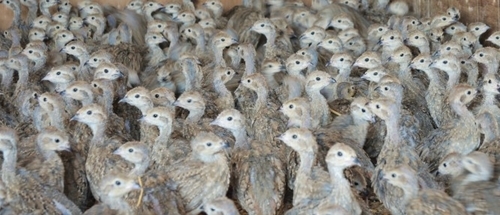
By Dr Ellis Draaijer DVM, Poultry Business Development Manager, Kernfarm
It is widely known that Mycoplasma gallisepticum (Mg) is one of the most prevalent diseases that affects gamebirds. Once a flock is infected, no treatment can free that flock from it completely, and the disease can flare up when birds are stressed. The bacteria therefore causes significant economic loss, and health and welfare issues.
While no one approach and no veterinary intervention (vaccines, antibiotics etc.) will offer 100 per cent success, there are many things one can do to keep the infection out or minimise clinical impact.
It is so important that the industry keeps communicating openly on the topic of Mycoplasma in order to increase the overall awareness of the infection, to learn from each other by exchanging experiences, and to reduce spreading and clinical disease.
Openness around positive flocks enables specialised veterinarians to offer their support in the earliest stages of a potential outbreak and minimise impact on animal welfare and economic parameters.
Recently, a new, injectable, inactivated Mg vaccine was registered for chickens in the UK, which, in the absence of an available registered product, is allowed for use in gamebirds. The scientific research behind the vaccine proves that using it alongside good husbandry and biosecurity is a powerful preventive tool against Mg.
Mycoplasmas usually firstly infects the bird’s upper respiratory system: the nose, sinuses and throat. Signs of the disease we need to look out for include coughing, sneezing, swollen eyes, and thick heads caused by severe inflammation of one of the sinuses (sinusitis).
Affected birds often have wet shoulders from wiping away discharge from their eyes and
nose. The affected flock will also have poor growth and increased mortality.
The disease is more difficult to manage than many other bacterial infections, because it spreads both vertically from hens to egg and chicks, and strategies to decrease the impact of the disease, minimise shedding and spreading on the farm, and to other farms or shoots.
Different methods are available, and you will need to consult with your veterinarian to choose the right method. In general, we can choose between two methods: we can look for Mycoplasma gallisepticum (the bacteria itself) or check if the birds have Mg antibodies in their blood (serology).
Important preventive measures include purchasing only Mg free (tested) stock, asking for a recent Mg status report when buying new birds, using all-in, all-out systems, optimal biosecurity and hygiene practices, regular clinical check-ups of a flock for signs of disease, taking periodical samples and swabs for Mg PCR, and blood samples.
Optimising biosecurity practices and hygiene is of paramount importance when dealing with
flocks. For example, cleaning and reduce Mg associated clinical signs, Mg shedding from infected to healthy birds in the flock, and vertical Mg transmission through the egg to the chick.
Testing also shows that this type of killed vaccine induces an antibody response in the blood, and similar benefits, in gamebirds as well as in chickens. With no registered alternative available and now also registered in the UK, it’s (off-label) use in gamebirds is growing.
While vaccines will never be 100 per cent effective in preventing infection, research shows that the impact and spread of the disease will be much lower if administered. Optimising biosecurity and minimising stress therefore remain highly important in keeping Mycoplasma at a low level, and these measures determine the level of success that can be reached with vaccination.
Get the Latest News & Advice
Stay updated on the latest news, advice and research. Sign up FREE today.
*You may change your mind any time. For more information, see our Privacy Policy.